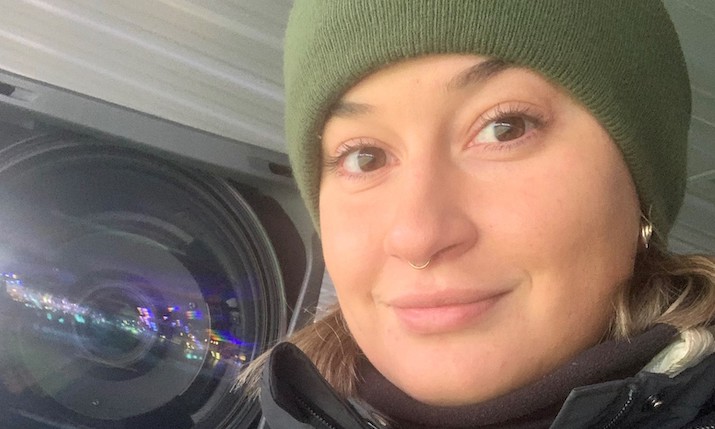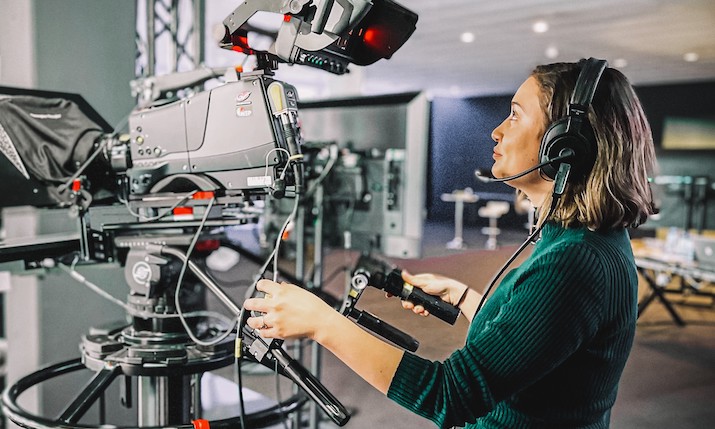Going solo: Camera operator Tunya Koch takes on the world of live sport

Koch: ‘Anything can work out with genuine interest, hard work, and some networking’
“I wasn’t looking to work in sports broadcasting, I think sports broadcasting was looking for me,” says Tunya Koch, freelance camera operator for NEP Switzerland. “There are no female camera operators in NEP Switzerland to look up to, so I decided to become that woman.”
As well as her post at NEP Switzerland, Koch owns a video company and freelances as a video and media coach, but her career began in video journalism.
She planned on graduating in multimedia production, but after an internship as a VJ at the local online news agency, she got a job offer at the local TV station. “So I kept on working,” she says. “After receiving another job offer and working nationally, I figured that going back to study multimedia production would be a waste of time since I was learning everything on the job. After some time, I changed to an online news platform and started working nationally.”
She first got a taste of sports broadcasting in 2019. “I had to report on the soccer coach from FC Luzern in Zürich Letzigrund Stadium. I had never seen a broadcast van before and had never stood ‘right beside’ the players,” she says. “I was rather jealous of the crew operating those big fancy cameras.
“I worked as a video journalist for three years full time and kept on freelancing after quitting my job to start my own business,” she continues. “I always share my video/camera passion on my social media channels, and once I shared that I quit my full-time job, a technician from NEP Switzerland reached out to me as a loyal follower, asking me if I would be interested in working in sports broadcasting.”
“There are no female camera operators in NEP Switzerland to look up to, so I decided to become that woman”
“It was something new,” she continues. “But not as simple as a ‘new job’. It was something I didn’t see myself in before, and that’s why I got curious. Of course, sports broadcasting is like a huge playground. In every corner, there is something new to learn about engineering, visual engineering, the cameras themselves or even how to roll up cables properly.”
“It was hard being the new one in the team,” she continues. “As in every job, you have to find your role in the pack. They accept you, but this doesn’t mean that you are a ‘part’ of the group. Everyone in the team already worked in sports broadcasting for years and 98% of the camera operators are male. So, it was difficult at first being the youngest and being female.”
Koch started operating the interview camera at NEP Switzerland since she was used to doing interviews back in her journalism days. “After some months I asked for more. I wanted to operate a camera during the game.”
Good times, bad times
It’s obvious that Koch loves her work. “Every production is special to me and I’m thankful for every time I’m on the field. There are so many good souls at NEP Switzerland, and I really enjoy working with them.”
She enjoys the moment “when the red light goes on”. “I love to contribute my images to the story creation of the director,” she explains. “I enjoy experiencing new camera positions, learning new roles, and realising afterwards how much I am improving after every game.”

Koch: ‘I enjoy experiencing new camera positions, learning new roles, and realising afterwards how much I am improving after every game’
“I recently got the chance to operate with a Canon Digisuper 76, 9mm-690mm lens – this was pretty awesome,” she adds. “I’d love to get to work more with such lenses this year. And I wish to try out working at other sports, like skiing or volleyball.”
There are challenges though.
“I find it difficult to improve my skills and knowledge because there is so much you can only
learn at the job,” she says. “You have to find your own ways to get better, ask your teammates how they do it, observe them while they are filming, watch games, ask to sit in the broadcasting van and analyse the cameras, EVS, the cut and the visual engineering.”
Sadly, the most challenging aspect of Koch’s job is “being constantly exposed to sexism”.
“The sports industry isn’t used to women on the field, so they question them when they see one,” she explains. “This makes it sometimes frustrating and hard. There are always different reactions to my role on the job. People who know me treat me like a member of the team. People who don’t know me think I am out of place. People who see me work start respecting me.”
“The industry, as a whole, isn’t always woman-friendly,” she continues. “You must get along with jokes, you have to set boundaries and you have to be aware of how you show up. I’m not talking about wearing makeup or not, but if you show some sort of weakness, you will be questioned. There once was a technical problem at a stadium while I was doing a single-camera production. It was taking me some time to solve it. A member of the stadium crew came up to me and asked why they didn’t send a man to do the job because it seemed like I couldn’t handle it.
“This is the challenging part, also because you know it will probably happen again. But it’s the reason why women have to keep on showing up in sports broadcasting – so that maybe the next generation of female camera operators won’t have to endure such treatment.
“The best way I have found to get past those challenges is to talk to other crew members who are close to me and support my efforts to become a better camera operator after every game,” she continues. “For example, I’m used to greeting team members with a hug, of course only the ones who are close to me and are ok with it. When I’m meeting people for the first time, I give a friendly handshake or a fist bump.
“One time a guy started kissing me on the cheek to say ‘hello’. I tried to stop it before it started, but he didn’t. So, I told him strongly that I didn’t want him to kiss me on my cheek. Unfortunately, he then stopped greeting me at all in future productions. I seriously asked myself if I’d done something wrong. I talked to another crew member about it and he supported me in my reaction and statement. This meant a lot to me.”
“By sharing my story and my passion with the world through my socials, I can prove every person wrong who underestimated me because of my gender or my appearance,” she adds.
Living the dream
Koch is enthusiastic about live sport. “I grew up with football as a “religion”, because my mum is Brazilian,” she says. “It’s my dream to be a camera operator at a FIFA World Cup game when Brazil is playing.
“[I want to] represent women in sports broadcasting, proving to every little girl that they can become whatever they want,” she adds, advising women to “just go for it”. “Talk to people already working in this industry. Anything can work out with genuine interest, hard work, and some networking. It can be hard sometimes, and people may only see you as a woman, but you are the one creating the picture they are watching at home. Claim your spot!”
